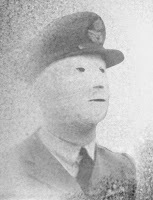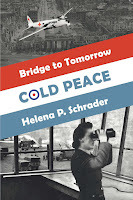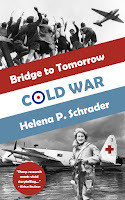The Characters of "Cold War" - David Goldman, Entrepreneur
An important theme of the Bridge to Tomorrow Series is the scars of war and how they affect us for the rest of our lives. No one embodies this more completely than David Goldman -- one of Dr McIndoe's "guinea pigs," who lost his face after his Hurricane engine caught fire in 1940.

David Goldman is the son of a German-Jewish banker, who got his family out of Nazi Germany in early 1934. David's rich father can finance private flying lessons, and David obtains private and commercial flying licenses in Canada, where his family has settled. In the summer of 1940, David volunteers for the RAF and comes to Britain. He joins a Hurricane squadron and is shot down in flames during the Battle of Britain. It takes years of plastic surgery to recreate a face and hands. In the latter years of the war, David serves as a flying instructor rather than in combat.
After his father leaves him a fortune in 1947, David establishes a private air ambulance company operating a single modified Wellington-bomber. His partners are his wartime friends Kiwi Murray and Emily Priestman. The company is based in RAF Gatow, and when the Russians lay siege to the city, the ground crew refuse to remain in the beleaguered city. David, however, is not prepared to pull out. He not only recognizes that the ambulance is needed more than ever before, he also admires the courage of the Berliners -- and has fallen in love with a German woman, Charlotte Graefin Walmsdorf. He is determined to stay and make the company viable.
Here an excerpt featuring David:
David got to his feet and left the librarywith its floor-to-ceiling bookshelves and rich Persian carpets. He wandered intothe cheerful winter garden. Until a week ago, the view from here had beenof a wide, well-kept lawn stretching to the banks of the Havel River. It hadbeen as lush, green and gracious as his childhood home above the Aussen Alsterin Hamburg. With the start of this blockade, however, the Priestman’s Polishcook Jasha had, with the help of the gardener, turned most of it into a massivekitchen garden.
Much as he loved the understated luxury that hadcharacterised the house before this conversion, he found the spirit ofendeavour exemplified by the cook and gardener significant. Rather than moaningto the Western Allies about dried eggs, dried milk and dried potatoes — muchless rioting as the Soviets had expected — all across the city the Berlinerswere defiantly digging in and declaring their determination to fight for theirfreedom. That impressed him. It even inspired him a little. It was part of theinchoate spirit that slumbered under the ruins of this city and made him warmto it despite its hideous face.
After all, his own face had once been hideoustoo. When he was first delivered to Dr McIndoe’s care after being shot down inSeptember 1940, it had been so repulsive it had made one nurse vomit. As thefamous plastic surgeon reconstructed his face one operation at a time, it wentthrough phases when it resembled a Chinese rice paddy, Frankenstein and a Greektheatre mask. Only gradually had it fused and formed itself into something morehuman. Eventually, it had become supple and marked by wrinkles. Few peoplenowadays suspected that his eyebrows had been cut from the skin under his arms orthat his lips and eyelids were taken from the inside of his thighs. Yet evenwhen his face had been at its most alien, the flame of his being had burnedbeneath the ugly surface.
Berlin, he thought, might be like that.Disfigured not only by the occupation and the bombing but by the Nazis beforethat. The Nazis — loud, violent, and aggressive — had obscured and drowned outthe others, but they had never represented all of Germany.
Living here had brought back memories of two childhoodfriends who stood by him after the Nazis came to power. Their memory had beenburied under the corpses of Auschwitz, Treblinka, and all the rest. What weretwo teenage boys distressed by what was happening to their Jewish friend comparedto the horrors of Nazi genocide? Yet they had been good to the core, and theywere not alone.
People like Ernst Reuter, Berlin’s SocialDemocratic Mayor, and the city councillor Jakob Liebherr had spent years in a concentrationcamp because of their opposition to the regime. Christian Freiherr von Feldburg, despitehaving flown Messerschmitts for the Luftwaffe, hated the Nazis with every boneof his body because they had dishonoured his country. Indeed, Feldburg wasbitterly committed to bringing the worst criminals to justice, while proudlyreminding the Allies — and the Germans themselves — that not all Germans had beenblinded by Nazi propaganda and victories. David had discovered that he wantedto work with men like these who were determined to rebuild a better Germany.
And it wasn’t just the opponents of the Naziswho had won him over. David had also come to sympathize with men like DrSchlaer, the optometrist who had taken over his uncle’s shop on theKurfurstendam. Yes, Dr Schlaer had done nothing to stop the SA from breakingthe windows. Yes, he’d served as a medic in the Wehrmacht. Yet he rememberedDavid’s uncle with respect and affection and was ashamed of what had been donein the name of Germany. That, David had discovered, was enough. Men likeSchlaer would also contribute to a new Germany and David was comfortable helpingthem.
He knew that the vast majority of Germans had cheeredand preened and lapped up Nazi racial ideology. They had loved being “themaster race,” predestined to conquer, rule and prosper. He understood thattheir selfish egotism had enabled the slaughter of millions. He despised theGermans who had swelled with pride when they oppressed others and now wallowedin self-pity because they were themselves oppressed. For such men and women,however, the humiliation of complete defeat and occupation representedsufficient retribution. Their presence no longer deterred David from wanting toremain in Berlin.
Yet the most compelling reason for staying herewas Charlotte. David had never felt the same way about any other woman in hislife. She was so vulnerable, so fragile despite her height and almost masculinefeatures. From the moment he set eyes on her, he’d felt a protectiveness forher. He wanted to be her knight in shining armour. In the best tradition ofchivalry, he wanted to be her servant, obedient to her wishes. Yet she wasskittish and shy, and he didn’t know how to approach her. Instead, they dancedaround what he sensed was a mutual attraction and hid behind their officialroles as employer and employee.
Which brought him back to his accounts and theserious situation he found himself in. He turned his back on the re-purposedlawn and returned to the library to face facts. The company had already run upsubstantial debts before the blockade started, but no sooner had the Sovietsmade their move than his British ground crew had mutinied and refused to remainin the beleaguered city. His partner Kiwi had flown them back to the UK intheir modified Wellington to give them a week to think things over. Aviationjobs, after all, didn’t grow on trees. But David had heard nothing from themsince.
Meanwhile, the Berlin City Council waspressing him to resume flights. Jakob Liebherr had called him just this morningto impress on him how urgently the city needed the services of his company — whileadmitting that they were still unable to pay him. They had again suggested thatthe company approach the Western military governors with a request for theAllies to cover the cost of evacuating patients.
David was not optimistic about that proposition.The Allies were spending astronomical sums on the Airlift already. He could notimagine them being receptive to a request to compensate a private company.
David is a character in both of the First two volumes of the Bridge to Tomorrow Trilogy

The first battle of the Cold War is about to begin....
Berlin 1948. In the ruins ofHitler’s capital, former RAF officers, a woman pilot, and the victim of Russianbrutality form an air ambulance company. But the West is on a collision coursewith Stalin’s aggression and Berlin is about to become a flashpoint. World WarThree is only a misstep away. Buy Now
Berlin is under siege. More than twomillion civilians must be supplied by air -- or surrender to Stalin's oppression.
USAF Captain J.B. Baronowsky and RAF FlightLieutenant Kit Moran once risked their lives to drop high explosives on Berlin.They are about to deliver milk, flour and children’s shoes instead. Meanwhile,two women pilots are flying an air ambulance that carries malnourished andabandoned children to freedom in the West. Until General Winter deploys on theside of Russia. Buy now!
Based on historical events, award-winning and best-selling novelistHelena P. Schrader delivers an insightful, exciting and moving tale about howformer enemies became friends in the face of Russian aggression — and how closethe Berlin Airlift came to failing.
Winning a war with milk, coal and candy!



